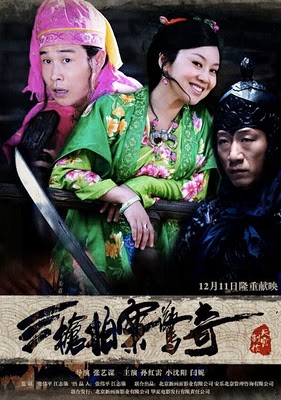
A WOMAN, A GUN AND A NOODLE SHOP
China, 2010, 95 minutes, Colour.
Directed by Zhiang Yimou.
In this era of international remakes of films, were a competition to be held to suggest the least likely combination, a sure winner would be celebrated Chines director, Zhang Yimou (Raise the Red Lantern, The Road Home, Hero) re-making a Coen Brothers film. But, Zhang going back to the Coens' first film, Blood Simple, here it is.
After a series of stages in an illustrious and colourful career, a highlight being the opening ceremony of the Beijing Olympics, Zhang Yimou can do what he likes. He has obviously decided to amuse himself and amuse his audience. At the time that Blood Simple was released in 1985, Zhang Yimou was a cinematographer with an eye for beauty, colour and composition. His first series of films was a fine evocation of Chinese domestic history. In the late 1990s, he directed more quiet and simple masterpieces, Not One Less and The Road Home. Whether influenced by the awards and acclaim for Ang Lee's Crouching Tiger, Hidden Dragon, he embarked on a new phase with spectacular and exquisitely designed epics, Hero, House of a Thousand Daggers, Curse of the Golden Flower.
In the meantime, the Coens have shown an extraordinary versatility in subject, style and genres and have won many awards. These careers highlight the range of cinema, Chinese and American, in a quarter of a century.
Zhang has taken the basic plot of Blood Simple and transferred it to an exotic and exotically-landscaped China. At times, it is farcical – the hero is a klutz and accident prone. He and the noodle shop servant offer clumsy comedy, except for a wonderful display of pasta-twirling. The boss and his wife are melodramatic. The local police chief is cross-eyed.
However, the corrupt and conniving officer is played straight and gives the bizarre proceedings more gravitas than they deserve and provides effective suspense and drama for the Chinesisation of the Coens.
1.Entertaining, stylised, East meets West in cinema?
2.The work of the Coen brothers? The Chinesisation? Plot, mood, spirit, sardonic humour?
3.Zhiang Yimou and his career, cinematographer, director of serious films, quiet films, martial arts spectaculars? Beijing Olympics? The place of this film in his CV?
4.The setting, Mediaeval China, the Persian merchants, the martial arts sword display, the selling of the guns and cannons? The noodle shop?
5.Isolated, the shop, the buildings, upstairs, downstairs, the courtyards? The film’s use of all the space? Doors and windows, the escape panels?
6.The mountains and their shapes, colours, the bright colours, the road, the desert? Sunrise, the moon, the sky? A film to delight with colour? The musical score?
7.The opening, the flare of the demonstrations, the Persians, the joke about ‘Must die – Moose die’? The buying of the gun, the bargaining, the demonstration of the cannon, the explosion?
8.The police, the equestrian troop, the colour blue, helmets and armour? Formation? The cross-eyed leader? The cannon and its effect? The interrogations, the demonstration of making noodles, the police enjoying the food? The information about the prisoners, captured for infidelity? The accusations against the wife and Li? The officer selected to investigate?
9.The boss, his age, relationship with his wife, ten years, no child? His cut-outs, the violence against his wife at night? Her making the divorce document? (And her nightmare that he returned to challenge her about it?) His being taken to the carriage to witness the infidelity? The irony that Li was healing the blisters?
10.The officer, his personality, strong, silent, reporting to Wang, bargaining about the fee, agreeing to kill the couple? His shooting the boss? His attempt to rob from the safe? Being interrupted? His escape?
11.The staff of the shop, the comic touches, the routine for making the pasta, whirling it? The fat servant, the young girl? Comic behaviour?
12.The wages, the servant and the girl tentatively going to the safe, returning, opening it, taking just their wages? The question of interest? The servant returning to rob the safe, the encounter with the officer, his being killed, his body being taken, on horseback, buried in the desert?
13.The wife, the relationship with Li, wanting a new life, divorce? Abuse by her husband? Buying the gun? Li seeing her drunk, finding the body, making the assumption that she had shot her husband? Li mopping up, carrying the body, the carriage, the effort of burying the body, the equestrian group passing?
14.The incidents and the accidents, Li's toilet break, finding the pipe, the officer returning?
15.Li, the encounter with the wife, discovering the truth? Her being drunk?
16.Li's death, the wife taking the gun, the pursuit upstairs, putting the scissors into the officer’s hand, his hacking the door, her shooting him? His final ironic comment about seeing Wang in Hell?
17.Blood simple, the genre and its use with Chinese effect and perspective?